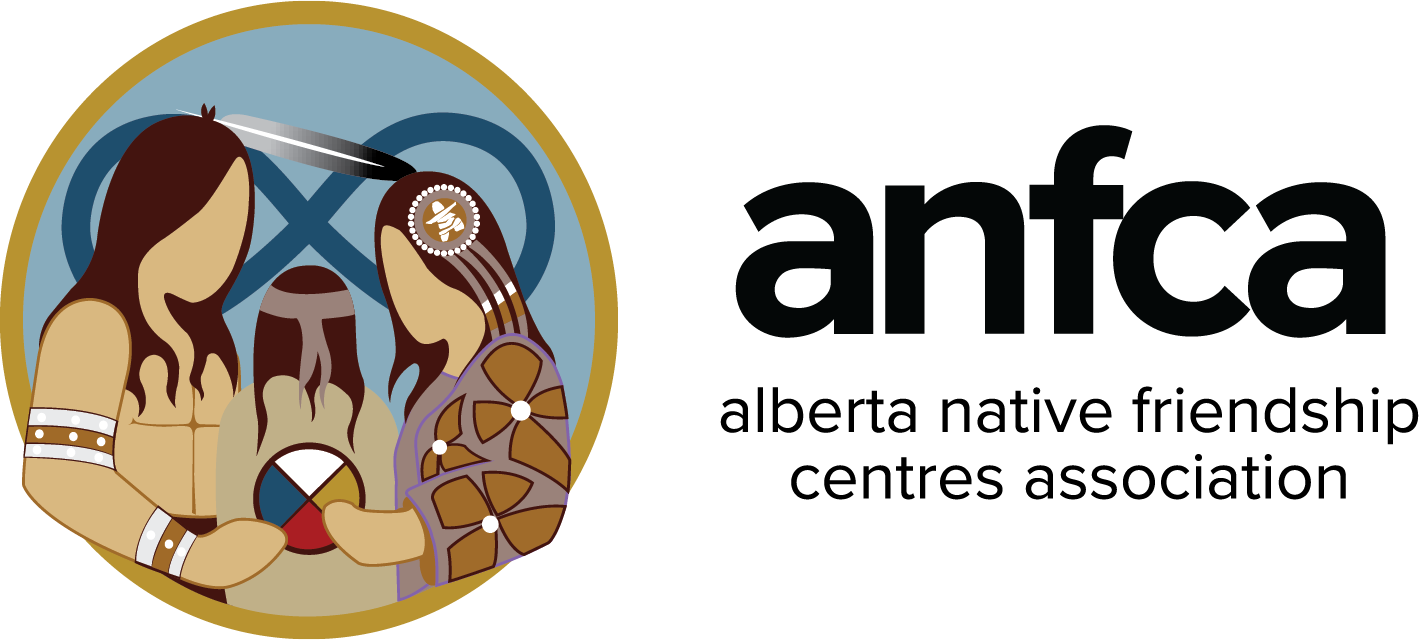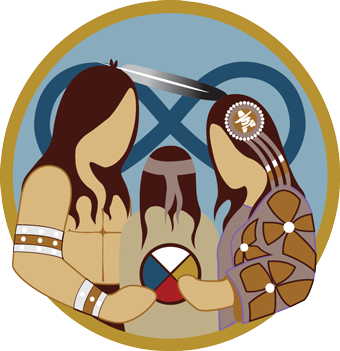Friendship Centre Movement
As part of a larger national structure known as the Friendship Centre Movement, the ANFCA works alongside other PTAs and the National Association of Friendship Centres (NAFC) for the betterment of Friendship Centres all with a goal to uphold and advocate for effective resources to address the needs of the growing urban Indigenous population across Canada.
Our shared history
The Friendship Centre Movement began in the mid-1950s when local groups were formed across Canada to represent the interests of Indigenous peoples migrating from outlying reserves and Métis Settlements to urban areas. These groups became known as Friendship Centres.
Friendship Centres were and continue to be dedicated to providing culturally-based programs and services that respond to the distinct needs of urban Indigenous people. They are known for their ability to bridge gaps that exist between Indigenous and non-Indigenous peoples in urban areas. Friendship Centres have long been recognized by government and community members for contributing to the revitalization of Indigenous culture; developing greater awareness and understanding of urban Indigenous peoples and their role in Alberta communities.
In the late 1960s, Friendship Centres began organizing into Provincial/Territorial Associations (PTAs) aimed at providing administrative support to each of the local Friendship Centres within their specified region. The increased organizational network that resulted from the creation of PTAs enabled local Friendship Centres to focus more diligently on assisting Indigenous peoples in adjusting to their new urban environments.
On April 28th, 1970, the Alberta Native Friendship Centres Association (ANFCA) was the first Provincial/Territorial Association to be incorporated in the Friendship Centre Movement. In the years that followed six additional PTAs were formed across Canada. During this time of foundational growth and development, the National Association of Friendship Centres (NAFC) was established to ensure a national Friendship Centre perspective was championed.
The NAFC was established in 1972 to represent, nationally, the growing number of Friendship Centres emerging across Canada. As the national body of the Friendship Centre Movement, the NAFC is democratically governed by a voluntary Executive Committee and a volunteer Board of Directors, is status blind and accountable to its membership.
In Alberta, twenty Member Friendship Centres work to improve the lives of urban Indigenous people in their communities. As part of their mandate, Friendship Centres welcome all community members regardless of place of origin or status to partake in their services and programming – they are status blind and non-political, not representing, but supporting and advocating for all community members who seek their support. This sense of inclusivity has earned Friendship Centres the reputation of a caring, culturally driven community organizations who are committed to improving the socio-economic situations. Inclusivity is one of the core values of the Friendship Centre Movement.
Some Interesting Friendship Centre Details
As grassroots organizations, Friendship Centres rely on the valuable contribution of volunteers and staff in order to make their programs successful and to realize genuine improvement in the quality of life of urban Indigenous people.
Over 3,200 Friendship Centre members contribute over 67,000 hours of volunteer hours per year to Friendship Centre projects and events. Over 250 individuals are employed by Friendship Centres.
Within the ANFCA region, member Friendship Centres serve over 100,000 people annually, of which approximately 75{9771b35175b5cc2a09291a1bddc8a8f6a3a4252d176711794895002134640f17} are of Indigenous ancestry and 25{9771b35175b5cc2a09291a1bddc8a8f6a3a4252d176711794895002134640f17} are non-Indigenous.
There are member Friendship Centres located in urban centres as small as High Prairie (2,600 people) to the City of Calgary (1,096,833 people). The most northern centre is located at High Level in the northwest part of the province with the most southern centre located at Pincher Creek in the further southwest corner of the province.
Friendship Centres not only support their 20 urban centres, but provide programs and services to urban Indigenous people transitioning to urban centres from over 140 First Nations reserves and 8 Métis Settlements as well as to the urban Indigenous people not connected to a nation or land base.
Friendship Centres are determined, creative, resourceful – they are skilled at leveraging funding contributed by federal and provincial governments. It is estimated in Alberta over $9 million dollars is annually contributed through leveraging efforts of the 20 Friendship Centres in Alberta. This level of achievement is attributed to dedicated individuals working tirelessly to develop programs and services designed to improve the quality of life of urban Indigenous families and individuals.
Governance and Organizational Structure
Membership:
Alberta Native Friendship Centres Association membership consists of 20 Friendship Centres. Delegates appointed from each of the twenty-member Friendship Centres the ANFCA Board of Directors. In addition, each member Friendship Centre selects one individual to join and participate in the Elders’ Wisdom Circle (EWC) and the Alberta Aboriginal Youth Council (AAYC). Executive Directors from each of the twenty members join together to form the Executive Directors Committee. Regional working groups are established on an as needed basis.
Board of Directors
The Alberta Native Friendship Centres Association’s provincial Board of Directors is made up of representatives from each of the 20-member Friendship Centres. During the ANFCA’s Annual General Meeting each member Friendship Centre appoints two (2) voting delegates and during Board meetings, each member Friendship Centre appoints one (1) voting delegate.
The ANFCA’s Board of Directors is made up of interested individuals that have been appointed by their home community to represent the interests of their region and to bring a voice and a vote to the provincial Board of Directors.
Executive Committee
The ANFCA operates with the direction of an elected Executive Committee. The President, Vice President, Treasurer, Secretary, National Board Representative, National Youth Board Representative, are elected by their peers from the provincial Board of Directors. The Elders’ Wisdom Circle annually appoints a Provincial Elder to sit on the ANFCA Executive Committee.
To provide balance and equality the Alberta Aboriginal Youth Council and the Elders’ Wisdom Circle each nominates a representative from member Friendship Centres to provide input on issues and to ensure a strong commitment to culture is maintained. This nominated representative is then endorsed by the Board of Directors.
Elders’ Wisdom Circle
Formed in 2000, the Elders’ Wisdom Circle provides a format for Indigenous Elders of all cultures to join together in fellowship, to make recommendations to the ANFCA Board of Directors on issues as they relate to culture, programming and organizational direction, to increase opportunities for Elders to engage and interact with youth, to access training and educational opportunities as they relate to current and emerging issues.
Elders represent each member Friendship Centre throughout Alberta and represent the diversity of Indigenous cultures found in the province.
Alberta Aboriginal Youth Council
Originally formed as the Provincial Aboriginal Youth Council (PAYC) in 1996, this group was renamed the Alberta Aboriginal Youth Council in 2003. This energetic group of Indigenous youth representatives comes together from across the province of Alberta to partake in cultural events and activities, to develop leadership skills, and to participate in provincial scope training and projects such as the Indigenous Youth Multi-Media project of Family Violence and Bullying.
Each member Friendship Centre can appoint a youth representative to attend regular ANFCA meetings and to partake in other provincial events and activities.
ANFCA Operational Structure
ANFCA is headed by an Executive Director who is responsible for the overall operations and outcomes of the Association. Reporting directly to the Board of Directors, the Executive Director is responsible to implement the strategic direction provided by the Board and to guide the operational implementation of programs and services.
ANFCA envisions an organizational structure in which our provincial office employs an appropriate variety of personnel to optimally fulfill the mandate of the Association.
Organizational Structure:
As a grassroots-based organization, ANFCA, through its member Friendship Centres has a direct connection to the urban Indigenous community in our region.
From the local community, each autonomously organized Friendship Centre elects a local community based Board of Directors.
From these Boards, the ANFCA member Friendship Centres appoint delegates (two from each member Centre at ANFCA’s AGM) to form the provincial Board of Directors. ANFCA’s Executive Committee is elected (and duly appointed in the case of Elder) from the Board of Directors.
Our grassroots structure ensures that local community members’ needs guide the direction of programs and services at the community (Friendship Centre), provincial (ANFCA) and national (NAFC) levels.
CODE OF ETHICS
In order for a Friendship Centre to be a member in good standing with the Alberta Native Friendship Centres Association, an individual Friendship Centre shall subscribe and be accountable to the following principles:
• A member of the Association shall be a community directed organization whose aims and objectives are consistent with Alberta Native Friendship Centres Association’s goals and objectives and the National Association of Friendship Centres’ standards.
• As a member of the Association, the Friendship Centre must first and foremost show respect and honour all Aboriginal customs and beliefs. The Friendship Centre must act and speak with the pride and dignity that Aboriginal heritage demands.
• The Friendship Centre must be committed to information-sharing, referrals, recreation and social activities, cultural reinforcement, community development and similar activities which ensure that Aboriginal people will be afforded a better quality of life through Aboriginal self-determination.
• The Friendship Centre must honour the belief of supporting unity amongst all Aboriginal people, regardless of legal definitions of Métis, First Nations or Inuit. In supporting this belief, Friendship Centres are expected to meet the needs of the community they serve.
• As an Association member, the Friendship Centre will at all times conduct itself in a manner that brings respect, integrity, credibility and tolerance to the Association and other Friendship Centres or other Aboriginal groups, even though they may disagree.
• The Friendship Centre will bring grievances, comments or complaints relating to the Association to the attention of the Board (similarly, the Association will bring any grievance, comment or complaint that the Association may have with respect to a particular Member Centre to the attention of the Board of that Member Centre).
• As an Association member, the Friendship Centre will endeavour to work cooperatively with other Friendship Centres to solve problems and support mutual concerns.
• The Friendship Centre will endeavour to work in a cooperative manner with other groups and organizations, be they Aboriginal or non-Aboriginal, in order to develop a humane society of equal opportunity for all peoples and respect for all living things.

